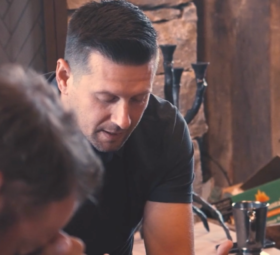
WHAT WE HEARD:
Amy Alexander is the Co-Founder and Executive Director of The Refuge Center for Counseling. Amy is a Licensed Marriage and Family Therapist who has been practicing for sixteen years. Her areas of clinical focus include trauma, domestic and sexual violence, grief and loss and identity work. It was ongoing Christian counseling and opportunities to serve on mission (both nationally and abroad) throughout adolescence, that solidified the faith that she placed in Christ as a child.
SIDE BAR:
Studies have indicated and proved that young adults who remain close to Christ in college and beyond are those who had consistent adults investing in their lives throughout their teen years and opportunities to serve and lead.
At the Refuge Center for Counseling, Amy seeks to serve people in all walks of life at all points of crisis. The vision of the Refuge Center was to be a systemic organization and allow all members of the family to receive help at one location. Rather than the sterile work environment provided at other sliding-scale, non-profit mental health providers, the Refuge Center committed themselves to providing an aesthetically and technologically advanced center. Amy credits the Lord for sustaining that vision. It’s the Refuge Center’s commitment to provide depth of ministry and complete trust in God to provide the rest, that makes the greatest difference.
WHAT IT MEANS:
At any given time, we all have 3-4 blindspots, things in life that are present but not visible to us. We need professionals in our lives to point out those issues so that we can live at optimal health. For men who are averse to seeking mental health support, it’s easier to point out that we see a dentist for things we can’t see, prevent, or fix ourselves. We take our car to auto repair shops for the same thing. People, particularly men, need to know that seeking emotional and mental health support is the same (necessary) thing. Which requires us to have sympathy and empathy for our peers.
Sympathy is noticing someone is in a hole and offering condolences and consideration.
Empathy is climbing down in the hole with them to offer emotional support and togetherness.
Warning signs for men include anxiety, anger, power and control among others that a man is struggling and needs help. When someone points out the blindspot or we begin to see the warning signs, additional help is necessary and available.
Switching gears, it’s not just individuals that can be healthy or experience hiccups. Organizational cultures can experience the same thing. Organizations heavy on relationships can suffer because teams don’t have the hard conversations. Work environments heavy on outcomes can suffer because teams don’t see or truly value one another. One of the indicators of a healthy culture is brave apologies, where high tier leaders make bold private and sometimes public apologies recognizing moments of weakness or failure within the organization and the effects on people. Knowing that God (and also others) can do things without us may be an ego killer, but it’s a consideration of overall health.
WHAT TO DO NEXT:
Take an inventory. Who is speaking into your life and making investments to help you be the best you can be. You need 4-7 non-family members who can do that. Who are your spiritual leaders? What is your church attendance and participation like? What are your go-to podcasts? How are you being spiritually renewed through scripture, music, sermons and reflection? It’s not enough to “set it and forget it” and avoiding challenges won’t eliminate them. Scripture is clear. Love matters more than results. It matters more than accolades and accomplishments. Figuring out a way to prioritize living in a way that illustrates love is worth the emotional/mental health work it will take to operate from that place.
MLN BOOK RECOMMENDATION:
Boundaries by Dr. Henry Cloud & Dr. John Townsend
To regain control of your life, you’ve never needed Boundaries more than you do today in today’s always-on, always-connected digital world. Drs. Henry Cloud and John Townsend wrote the New York Times bestselling book on Boundaries – the personal property lines that…(learn more)
-
![Tennessee Titans Locker Room]() Leading From the Locker Room to the Spotlight | Brett Kern
Leading From the Locker Room to the Spotlight | Brett Kern -
![Ben Midgette Post Cover - Child on Father's Shoulders]() Creating Milestone Moments With Your Child | Ben Midgette
Creating Milestone Moments With Your Child | Ben Midgette








